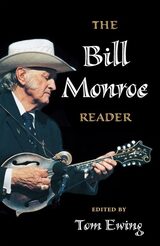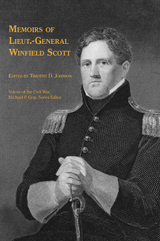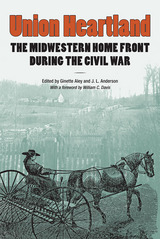
"Tell 'em I'm a farmer with a mandolin and a high tenor voice," Bill Monroe said. Known as the Father of Bluegrass Music, Monroe pioneered a whole new category of music and inspired generations of musicians and fans. Yet from his founding of the original bluegrass band through six decades of performing, he remained an enigmatic figure, a compelling mixture of fierce intensity, homespun modesty, and musical integrity.
Determined to play the mandolin in a way it had never been played before, Monroe distinguished himself in the mid-1930s with the Monroe Brothers then began forming his own band, the Blue Grass Boys, in 1938. By the mid-1940s other bands were copying his sound, and a new style, bluegrass music, was born. While country music moved toward electrification, Monroe maintained his acoustic ensemble and developed his "high, lonesome sound," performing nearly up to his death in 1996.
In this eclectic, richly illustrated reader, former Blue Grass Boy Tom Ewing gathers the most significant and illuminating of the many articles that have been written about Monroe. Through the writings of nearly sixty observers, interviewers, admirers, folklorists, and other scholars, along with Ewing's astute commentary, The Bill Monroe Reader offers a multifaceted view of one of the most influential country musicians of the twentieth century.
Lively, heartfelt, and informative, The Bill Monroe Reader is a fitting tribute to the man and the musician who transformed the traditional music of western Kentucky into an international sensation.

Scott joined the army in 1808, earned the rank of brigadier general in 1814, and was promoted to commanding general in 1841. During the Mexican-American War, he commanded one of the most brilliant military campaigns in American history and mentored the generation of officers who fought the Civil War, including Generals Grant, Lee, Longstreet, Beauregard, Jackson, and Meade. As a young general, he wrote the first comprehensive set of regulations to govern the army and pushed for the professionalization of the U.S. officer corps. Yet, he was ridiculed at the beginning of the war for his prescient prediction that the Civil War would be a prolonged conflict requiring extensive planning and superior strategic thinking.
With this edition, Johnson has merged Scott’s large two-volume memoir into a single, manageable volume without losing any of the original 1864 text. Extensive new annotations update Scott’s outdated notes and provide valuable illumination and context. Covering a wide range of events—from the famous 1804 duel between Aaron Burr and Alexander Hamilton through the end of the Civil War—Scott’s extraordinary account reveals the general as a sometimes
egocentric but always astute witness to the early American republic.
Timothy D. Johnson, professor of history at Lipscomb University in Nashville, is the author of Winfield Scott: The Quest for Military Glory and A Gallant Little Army: The Mexico City Campaign. He is coeditor, with Nathaniel Cheairs Hughes Jr., of A Fighter from Way Back: The Mexican War Diary of Lt. Daniel Harvey Hill and Notes of the Mexican War by J. Jacob Oswandel.

READERS
Browse our collection.
PUBLISHERS
See BiblioVault's publisher services.
STUDENT SERVICES
Files for college accessibility offices.
UChicago Accessibility Resources
home | accessibility | search | about | contact us
BiblioVault ® 2001 - 2024
The University of Chicago Press









